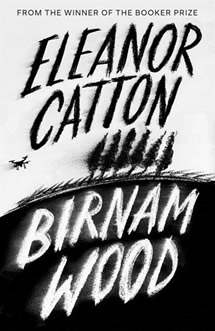Reviewed by Robert Goodman.
By Eleanor Catton, Allen and Unwin, $32.99.
 Eleanor Catton shot to literary fame by becoming the youngest winner of the Booker Prize in 2013 for her luminous historical novel The Luminaries. Ten years later she returns with Birnam Wood, much more contemporary, no less New Zealand but at the same time just as universal, a deep exploration of humanity that transcends time and place. But it does so within the bounds of a constantly beguiling, utterly unexpected and gripping story.
Eleanor Catton shot to literary fame by becoming the youngest winner of the Booker Prize in 2013 for her luminous historical novel The Luminaries. Ten years later she returns with Birnam Wood, much more contemporary, no less New Zealand but at the same time just as universal, a deep exploration of humanity that transcends time and place. But it does so within the bounds of a constantly beguiling, utterly unexpected and gripping story.
The book opens with what could possibly be considered a typical New Zealand tragedy – a landslide on a mountain pass which kills some and cuts off the small, National Park adjacent town of Korowai. This puts an end to new local and soon to be knighted local millionaire Owen Darvish’s plan to subdivide his wife’s family farm. But in the background another, more lucrative plan was forming – to secretly sell the property to American billionaire and doomsday prepper Robert Lemoine who made his money through drone technology. Meanwhile, at the other end of the spectrum eco-activists Mira Bunting and Shelley Noakes who run a guerrilla farming collective (they plant vegetables on public and private land) called Birnam Wood are heading towards a falling out. What keeps them together is an offer by Lemoine to fund them to set on Darvish’s land, a deal that even on its surface feels like it is with the very forces that Birnam Wood and its members campaign against. And when Catton digs into Lemoine’s real agenda she exposes it as much worse than that. Finally there is Tony, intensely opinionated, carrying a torch for Mira, but disaffected by her decision to take Lemoine’s money, who soon gets a sniff that there is something more going on and decides he is going to make his name as a crusading investigative journalist.
There is a lot of set up here which Catton does mainly through deep and complex character studies. Much like The Luminaries, she takes an almost 19th Century approach to exploring and exposing her main players. She is interested in the hypocrisies and the fault lines in her characters, the grey areas in which they operate and what they tell themselves in order to justify their actions. But this also allows the story to go in completely unexpected (but also completely justified) directions. Just when you think Catton is going to zig, she zags, keeping readers constantly on their toes as the pressure builds.
And in around this, Catton delivers a novel of ideas and issues. She critically examines the conservation movement and the bind that it finds itself in in order to operate effectively in the world and, the idea of demonstrative conservation in which the wealthy dabble in order to pretend to show some concern for the environment and the rapaciousness of the modern companies in the face of mounting evidence of the impacts of their greed. Catton does not spare her satire for either side of the debate – skewering some of the earnestness and hypocrisies of the environmentalists as much as the conservative wealthy.
Catton save some of her most enjoyable satiric fire for exploring modern New Zealand and the attitudes of New Zealanders. As an example, this reflection by Tony:
It hadn’t been until he’d gone abroad that he’d been able to identify this trait as particularly Kiwi, reflecting a broader attitude held among his countrymen that to do a thing with effort was always more respectable than to have it doe with ease; inconvenience, in New Zealand, tended to be treated as a test of character, such that it was a point of national pride to withstand discomfort or poor service without giving in to the temptation to complain.
Or this insight into the relationship between local millionaire Darvish and US billionaire Lemoine:
[Darvish] was intensely proud of their association, and felt he had fulfilled a lofty duty to his country, not just in courting foreign wealth, but in proving – in being proof – that New Zealand could hold its own among the world’s elite… At the same time, however, he wanted desperately to cut the man down to size – and in this he felt even more acutely Kiwi.
Birnam Wood shows Catton still well and truly at the top of her writing game. She makes you care about the characters and critically think about what they are doing and what they stand for. The writing is insightful, witty and compelling. And the plot develops as a pressure cooker, it is character driven and so sets up the reader to be both blindsided by developments while understanding deeply exactly why all of the events play out as they do.
Over 900 more reviews can be found on Pile by the Bed.











